De afdeling Grieks aan de UGent organiseert in de week van maandag 25 augustus tot vrijdag 29 augustus 2025 een zomercursus Oudgrieks. Wij richten ons zowel tot leerlingen uit het zesde middelbaar met voorkennis die hun Griekse grammatica willen opfrissen, als tot leerlingen zonder voorkennis, die met het Grieks willen kennismaken. Ook andere geïnteresseerden zijn welkom. In de namiddag worden er vrijblijvend activiteiten voorzien door de Klassieke Kring. Meer informatie vind je in de flyer zomercursus Grieks 2025.
Archives: Events
Crash Course in Greek Palaeography
The Greek section of Ghent University, in collaboration with the Research School OIKOS and the Royal Library of Belgium, offers a two-day crash course in Greek palaeography. The course will take place on 27-28 May 2025 in Ghent and Brussels. It is intended for MA, ResMA and doctoral students in Classics, Ancient History, Ancient Civilizations, Byzantine studies, Medieval studies and related fields. Students must have a good command of Greek. The course offers an introduction into Greek palaeography from the Hellenistic period to the end of the Middle Ages and is specifically aimed at acquiring practical skills for research involving literary and documentary papyri and/or manuscripts. Participants will gain hands-on experience with original papyri housed at Ghent University Library and with manuscripts from the Royal Library of Belgium in Brussels.
Programme
The course will take place over two full days, with one session in Ghent on Tuesday, 27 May, and the other in Brussels on Wednesday, 28 May. Specialists in Greek palaeography will deliver lectures providing a chronological overview of the evolution of Greek handwriting, accompanied by introductions into the material features of both papyri and codices. The lectures will be followed by practical sessions, consisting of supervised reading of selected extracts from papyri and manuscripts in small groups. There will be guided exhibitions of selected papyri (in Ghent) and medieval manuscripts (in Brussels).
Tuesday, 27 May 2025
09:30-10:00 Introduction to the Crash Course
10:00-10:30 Introduction to papyrology and the materiality of papyri – Dr. Serena Causo
10:30-11:45 Papyri of the Ptolemaic and Roman period – Dr. Joanne Stolk
11:45-13:00 Practice with papyri of the Ptolemaic and Roman period
13:00-14:00 Lunch break
14:00-14:30 Presentation of papyri from the collection of the Ghent University Library – Dr. Serena Causo
14:30-15:45 Papyri of the Byzantine period – Dr. Yasmine Amory
15:45-17:00 Practice with papyri of the Byzantine period
18:30 Dinner in Ghent (optional)
Wednesday, 28 May 2025
09:30-10:00 Introduction to the codicology of the Byzantine book – Dr. Grigory Vorobyev
10:00-10:30 Display moment 1
10:30-10:45 Coffee break
10:45-12:00 Byzantine book scripts 1: From the first codices to the eleventh century – Prof. dr. Floris Bernard
12:00-13:00 Reading practice 1
13:00-14:00 Lunch break
14:00-15:15 Byzantine book scripts 2: The Comnenian and Palaeologan periods – Prof. dr. Andrea Cuomo
15:15-15:45 Display moment 2
15:45-16:45 Reading practice 2
The teaching staff also includes Kyriaki Giannikou, Dr. Juan Bautista Juan-López, Eleonora Lauro, Dr. Divna Manolova and Dr. Chiara Monaco.
Practical information
The study load is equivalent to 2 ECTS credits (2×28 hours). In preparation for the course, participants will be required to read secondary literature which will be distributed several weeks in advance. Additional materials will be provided in order to help develop further reading skills after the course.
There is no participation fee for this course. Lunches will be provided on both days free of charge. Travel and accommodation expenses are the responsibility of the participants. The train connection between Ghent Sint-Pieters Station and Brussels Central Station is frequent, with a travel time of less than 40 minutes. Participants may choose to lodge in either city.
The course will take place at the following venues:
Registration
Prospective participants should register by sending an e-mail to grigory.vorobyev@ugent.be with a short motivation letter (approximately 300 words), detailing their academic background, research interests and motivation for attending the course. Priority will be given to MA and doctoral students associated with OIKOS and those who have not previously had the opportunity to study palaeography. The deadline for registration is 1 March 2025. Applicants will be notified of the outcome shortly thereafter.
Filmvoorstelling: ‘Where are you, Adam?’
Deze film – Grieks gesproken met Nederlandse ondertiteling – vertelt het verhaal van het eeuwenoude Grieks-orthodoxe kloosterleven op de ‘Heilige Berg’. Als kijker word je ondergedompeld in het afgezonderde, authentieke leven van de monniken van het Docheiariou-klooster.
Collega Kristoffel Demoen, die onlangs een bezoek bracht aan de Athos, zal de film inleiden met een verhaal over het verleden en heden van de monnikenrepubliek.
Synopsis
“Where are you, Adam?” speelt zich af in het oude Dochiariou-klooster aan de westkust van de berg Athos, het schiereiland in de Egeïsche Zee dat uitsluitend aan het oosters-christelijke monnikendom is gewijd. Beelden van de natuur worden afgewisseld met de bijna onophoudelijke ronde van werk en gebed van de monniken, waardoor een ritmische band ontstaat tussen de mens en de natuurlijke wereld die zinspeelt op een paradijs waarnaar we allemaal stilletjes verlangen.
Het juweel van deze rijke Byzantijnse omgeving zijn echter de monniken zelf, wier warmte en authenticiteit is gevangen door middel van een openbaring van hun dagelijks leven, elk met zijn vreugden, hoop en kwetsbaarheden. Door de filmmakers in hun midden uit te nodigen, hopen de monniken elke kijker aan te moedigen tot het ontwaken voor zijn eigen wederopstanding. Een centrale figuur in de film is de Kloosteroudste, Abt Gregory, wiens decennialange leiderschap hem een scherp begrip heeft gegeven van de zielen onder zijn hoede en hun verlangen om voor zichzelf een toestand te herwinnen die verwant is aan de menselijkheid van Adam vóór de zondeval.
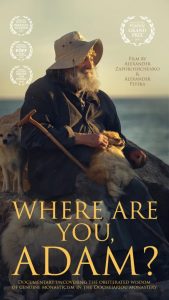
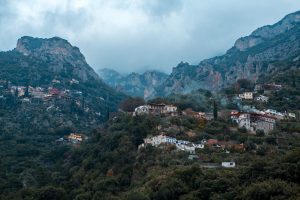
Praktische informatie
Wanneer? vrijdag 9 mei 2025, om 19u30
Waar? Auditorium 1 Jan Broeckx (Blandijnberg 2, Gent)
Talen? Grieks gesproken met Nederlandse ondertiteling
Prijs? €10 voor leden, studenten (m.u.v. PhD-studenten) en scholieren. Anderen betalen €13.
Inschrijven? Schrijf je in via dit formulier en schrijf het bedrag (€10/€13 per ticket) over op het rekeningnummer BE69 8803 2505 0178 (bevestiging volgt nadien). Let op: je inschrijving is pas definitief, wanneer het bedrag op bovenstaand rekeningnummer staat!
- meer info over deze film op de officiële website
- bekijk hier de Nederlandse trailer
Deze filmvoorstelling wordt georganiseerd i.s.m. de orthodoxe parochie Heilige Apostel Andreas van Gent.
Boekvoorstelling: ‘Leidraad door het labyrint: de macht van klassieke mythen in onzekere tijden’ (Evelien Bracke)
Evelien Bracke, Academia Press en het Griekenlandcentrum nodigen u van harte uit voor de boekvoorstelling van ‘Leidraad door het labyrint‘ op 4 juni in GUM & Plantentuin.
Programma
19u00 Welkom
19u30 Boekvoorstelling
- Voorwoord & overhandiging eerste exemplaar, Beatrice De Keyzer (uitgever)
- Verwelkoming door decaan Gita Deneckere
- Intro door Jacqueline Klooster (Rijksuniversiteit Groningen)
- Gesprek Evelien Bracke & Patrick De Rynck (Hic et Nunc)
20u30 Receptie + mogelijkheid om boek te kopen
21u30 Einde
Over het boek
Oude verhalen, nieuwe inzichten: klassieke mythen als gids voor de maatschappelijke uitdagingen van vandaag
Klassieke mythen zoals die van Achilles, Medea en Persephone zijn alomtegenwoordig, van films en boeken tot sociale media en games. Maar wat maakt deze eeuwenoude verhalen zo tijdloos? Waarom blijven ze zo fascineren, ook nu, in een tijd van razendsnelle technologische vooruitgang, geopolitieke chaos en een klimaatcrisis?
Leidraad door het labyrint onderzoekt hoe klassieke mythen, ondanks hun eeuwenoude oorsprong, verrassend relevant blijven in onzekere tijden. Ze bieden houvast bij hedendaagse politieke, technologische en ecologische vraagstukken en helpen de complexe uitdagingen van onze tijd begrijpen. Ze wijzen de weg door het labyrint van deze debatten en laten zien hoe je inspiratie kunt halen uit het verleden voor een betere toekomst.
‘Mythen zijn tijdloos, hoor je wel eens beweren. Nee, mythen zijn van onze tijd, ook de Griekse. Ze zorgen mee voor zingeving in wankele tijden. Dat is wat Evelien Bracke in dit fascinerende, rijk gedocumenteerde, verrassend actuele en zeer overtuigende boek laat zien.’ (Patrick De Rynck, classicus en auteur)
‘In dit helder opgezette boek onthult Evelien Bracke de volle rijkdom van een zowel gekoesterde als verguisde mythologische traditie. De verhalen bestaan in vele versies, maar blijken een onuitputtelijk betekenispotentieel te hebben. Daarom worden existentiële en politieke dilemma’s tot op vandaag geïllustreerd met Griekse mythen, die in Brackes subtiele interpretaties vaak meer vragen oproepen dan op het eerste gezicht lijkt.’ (Piet Gerbrandy, dichter, classicus en docent)
Praktische informatie
Wanneer? woensdag 4 juni 2025, om 19u30
Waar? zaal FORUM in het GUM (Karel Lodewijk Ledeganckstraat 35, Gent)
Inschrijven? Vooraf registreren is verplicht via deze link.
i.s.m. Academia Press
Emma Huig – Fabels, demonen en heiligen: Griekse literatuur op middeleeuws Sicilië
Voorsmaakje
Het eiland Sicilië was door zijn strategische positie eeuwenlang een ontmoetingsplaats van verschillende culturen, wat bijvoorbeeld te zien is aan de lokale architectuur en literatuur, die invloeden van verschillende culturen in zich dragen. De Griekse invloed op het eiland begon in de 8e eeuw v. Chr. en is zelfs vandaag de dag nog merkbaar. In het eerste deel van de lezing geef ik eerst een chronologisch overzicht van de Griekse aanwezigheid op Sicilië, met een bijzondere focus op de laatantieke en middeleeuwse perioden. Daarna geef ik enkele voorbeelden van Siciliaans-Griekse literatuur uit de late oudheid en middeleeuwen waarin specifieke Siciliaanse kenmerken duidelijk zichtbaar zijn.
In het tweede deel bespreek ik enkele Heiligenlevens van Siciliaans-Griekse heiligen, geschreven in de late oudheid en middeleeuwen. Deze teksten vormen een interessante collectie omdat zowel hun Siciliaanse als Byzantijnse achtergronden duidelijk zichtbaar zijn, met referenties aan historische figuren, plaatsen en gebeurtenissen. Daarnaast worden ze gekenmerkt door een opmerkelijk groot aantal creatieve en imaginaire elementen. Deze aspecten van de Heiligenlevens zullen in de lezing aan bod komen en in hun Siciliaanse context worden geplaatst.
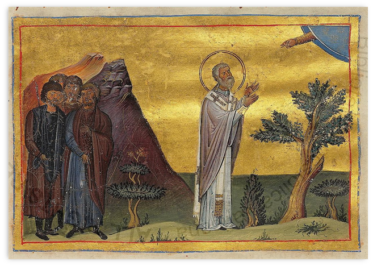
Over de spreker
Emma Huig is doctoraatsstudent aan de Universiteit Gent. Haar onderzoek gaat over Italo-Griekse hagiografie en de manier waarop geloofwaardigheid wordt geconstrueerd in deze teksten.
Praktische informatie
Wanneer? woensdag 23 april 2025, om 19u30
Waar? leslokaal 0.4 (Blandijnberg 2, 9000 Gent)
Prijs? gratis voor leden van het Griekenlandcentrum, UGent studenten (m.u.v. PhD-studenten) en scholieren. Anderen betalen €5 aan de kassa.
Boekvoorstelling: ‘Nieuwgriekse geschiedenis. De Griekse wereld van de late middeleeuwen tot vandaag’ (Pieter Borghart)
Voorsmaakje
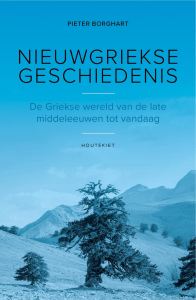
Op donderdag 27 maart stelt Pieter Borghart zijn nieuwe boek ‘Nieuwgriekse geschiedenis’ voor. Het boek, dat op 25 maart verschijnt – niet toevallig de Griekse nationale feestdag – vertelt het van de Nieuwgriekse geschiedenis, dat heel wat minder bekend is dan de Oudheid. Dat verhaal begint in de late middeleeuwen en neemt je mee op een fascinerende reis doorheen de laat-Byzantijnse, Frankische, Venetiaanse en Ottomaanse periode. Daarna komen de Griekse onafhankelijkheid in de negentiende eeuw en de uitbouw van de moderne natiestaat tot vandaag in beeld, tot en met de Europese integratie en de recente economische crisis.
Dit overzichtswerk beperkt zich niet tot geopolitieke en staatkundige ontwikkelingen, maar staat ook stil bij de evolutie van de Griekse taal en literatuur en de rol van de orthodoxe godsdienst. Het duidt hoe Griekstaligen in het verleden naar zichzelf keken en gaat in op de moeizame omgang van de moderne Grieken met de zware culturele erfenis uit de klassieke oudheid.
In zijn lezing zal Pieter Borghart vooral ingaan op de vraag wat het etiket ‘Nieuwgrieks’ precies inhoudt. De Griekse taal en cultuur kent een ononderbroken geschreven traditie van bijna 3000 jaar, maar vanaf wanneer kunnen we van ‘Nieuwgriekse’ geschiedenis spreken? En hoe verhoudt deze ‘Nieuwgriekse’ ontwikkelingsfase zich tot de Byzantijnse en Oudgriekse geschiedenis? Welke evoluties van geopolitieke, godsdienstige, taalkundige en cultuurhistorische aard in het eerste millennium van onze tijdrekening rechtvaardigen de keuze om de Nieuwgriekse geschiedenis in de twaalfde eeuw te laten beginnen?
Met een muzikaal intermezzo door To Schima en de mogelijkheid om het boek te laten signeren tijdens de receptie achteraf.
Over de spreker
Pieter Borghart is neograecus en classicus. In 2005 promoveerde hij met een studie over het naturalisme in de Nieuwgriekse literatuur, tussen 2007 en 2013 doceerde hij Nieuwgriekse letterkunde aan de Universiteit Gent. Naast heel wat (populair-)wetenschappelijke artikelen is hij ook de auteur van een boek over het Europese naturalisme (2006) en van ‘Inleiding in de Nieuwgriekse literatuur’ (2012, 2018).
Praktische informatie
Wanneer? donderdag 27 maart 2025, om 19u30
- 19u00 deuren open
- 19u30 start boekvoorstelling
- 21u00 mogelijkheid tot laten signeren
Waar? Liberas (Kramersplein 23, Gent)
Prijs? gratis, maar inschrijven is verplicht via deze link: https://houtekiet.be/blogs/evenementen/boekvoorstelling-nieuwgriekse-geschiedenis-pieter-borghart
i.s.m. uitgeverij Houtekiet en VBK België
Pieter Hendriks – Mikis Theodorakis, meer dan de sirtaki
Voorsmaakje
De lezing zal gaan over het leven van de Griekse componist en fenomeen Mikis Theodorakis (1925-2021).
Theodorakis was het symbool van het linkse verzet tegen de Griekse Kolonels die van 1967 tot 1974 aan de macht waren in Griekenland. Gedurende die jaren reisde hij de hele wereld over om met concerten, interviews en geschriften deze strijd onder de aandacht te krijgen en te houden.
De van oorsprong klassieke componist had aan het begin van de jaren 60 in Griekenland een muzikale revolutie ontketend door hoogwaardige teksten te gebruiken voor liederen die in hun ogenschijnlijke eenvoud een groot publiek bere ikten. Vanwege zijn linkse signatuur werd vanaf april 1967 zijn muziek in Griekenland verboden en werd hij na een aantal jaar opgesloten en geïsoleerd te zijn geweest verbannen uit Griekenland.
Pieter Hendriks zal vooral ingaan op de muzikale kant van het leven van Theodorakis maar aangezien deze onlosmakelijk verbonden is met zijn leven en het Griekenland van zijn tijd zullen ook deze zaken niet onbelicht blijven.
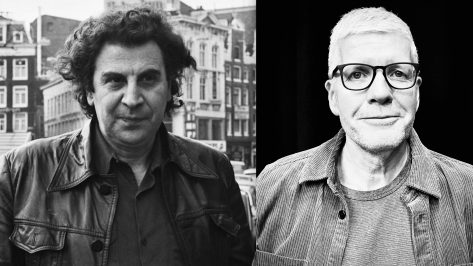
Over de spreker
Pieter Hendriks is als bas-bariton werkzaam als solist bij concerten en operavoorstellingen en maakt deel uit van het Groot Omroepkoor. Zijn fascinatie met de muziek van Theodorakis begon op zeer jonge leeftijd en heeft zich over de jaren uitgebreid tot andere Griekse muziekstijlen en componisten. Hij heeft naast muziek van Bach, Mozart, Orff en anderen verschillende werken van Theodorakis gezongen.
Hij is te horen op verschillende cd’s waaronder de King Arthur van Purcell door Barokopera Amsterdam waarvan een door hem gezongen aria te horen was in de Ridley Scott film over Napoleon.
Praktische informatie
Wanneer? woensdag 19 februari 2025, om 19u30
Waar? Auditorium 1 Jan Broeckx (Blandijnberg 2, 9000 Gent)
Prijs? gratis voor leden van het Griekenlandcentrum, UGent studenten (m.u.v. PhD-studenten) en scholieren. Anderen betalen €5 aan de kassa.
Griekse avond met lezingen, poëzie en muziek ter ere van de Griekse taal
Dit jaar viert de Griekse ambassade in België de Internationale dag van het Grieks in Gent, in samenwerking met het Griekenlandcentrum. Op het programma staan een lezing over over 3000 jaar Grieks in Klein-Azië en een hommage aan de grote dichter Giannis Ritsos. Er zullen gedichten worden voorgedragen en het Griekse koor van Brussel (Ελληνική Χορωδία Βρυξελλών) zorgt voor zang en muziek.
Na afloop volgt een receptie.
Praktische informatie
Wanneer? woensdag 5 februari, om 19u00
Waar? auditorium 5 Jeanne Wiemer (Blandijnberg 2, Gent)
Prijs? gratis, ook voor niet-leden. Inschrijven (voor 3 februari) is verplicht, via deze link: https://event.ugent.be/registration/EllinikiGlossa2025
Patrick Gouw, Het verdeelde eiland van Aphrodite: de ‘Cyprus-kwestie’ in historisch perspectief
Voorsmaakje
Cyprus gedenkt dit jaar 50 jaar opdeling van het eiland. Het zuiden en noorden worden sinds de zomer van 1974 fysiek gescheiden door een demarcatiezone (de zgn. ‘Green Line)’, maar de wortels van het versteende (en onoplosbaar lijkende) conflict gaan veel verder terug. Vanaf het begin van de 20e eeuw was de Grieks-Cypriotische bevolking in de ban geraakt van enosis, het streven tot aansluiting bij het ‘moederland’ Griekenland. Maar het Britse koloniale bestuur (sinds 1878) liet hiervoor geen ruimte. Toenemende etnische spanningen met de Turks-Cyprioten, die het eiland liever opgedeeld zagen (taksim) in een Turks en een Grieks deel, leidden in de jaren ’50 tot een explosieve situatie.
Met de onafhankelijkheid van de Republiek Cyprus in 1960 hoopten Groot-Brittannië, Griekenland en Turkije het probleem op te lossen, maar tevergeefs. Etnisch geweld bleef het eiland teisteren. Toen het kolonelsregime in Griekenland in 1974 de Cypriotische president en aartsbisschop Makarios middels een coup trachtte af te zetten – en zo effectief alsnog enosis probeerde te bewerkstelligen) greep het andere ‘moederland’ Turkije in. Na twee opeenvolgende militaire interventies bezette het een derde van het eiland, een situatie die nog altijd voortbestaat. Een VN-vredesmissie is nog steeds actief op Cyprus en Nicosia blijft de laatste verdeelde hoofdstad van Europa. Een oplossing voor het conflict lijkt verder weg dan ooit, mede vanwege de grote geopolitieke belangen.
In deze lezing doet Patrick Gouw het ontstaan, verloop én de toekomst van de ‘Cyprus-kwestie’ uit de doeken.
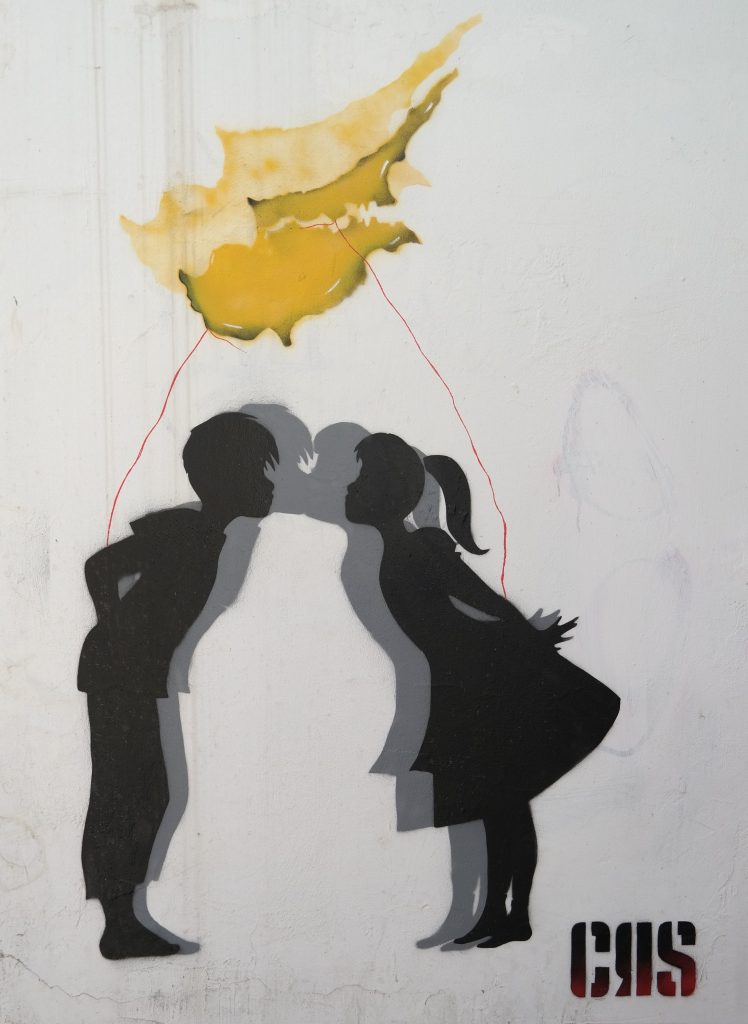
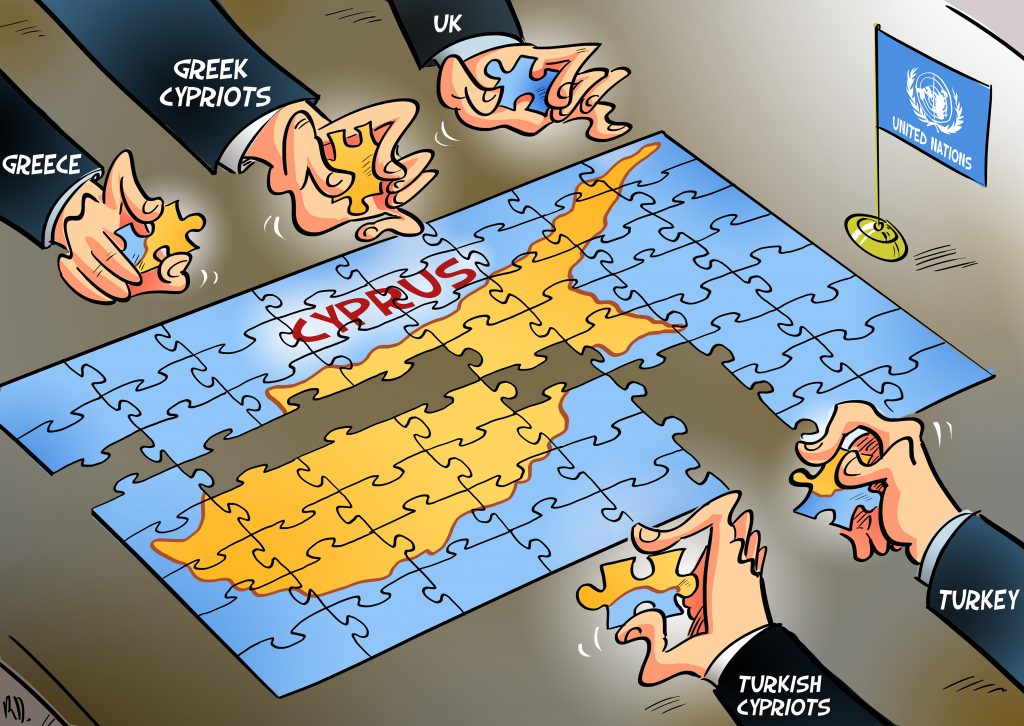
Over de spreker
Dr. Patrick Gouw is historicus en verbonden aan de Universiteit Leiden. Hij is gespecialiseerd in de Klassieke Oudheid, maar ook in de (vroeg)moderne geschiedenis van Griekenland en Cyprus. Daarnaast begeleidt hij jaarlijks diverse culturele groepsreizen naar het Middellandse Zeegebied en is hij redacteur van het tijdschrift Lychnari. Verkenningen in het Griekenland van nu.
Praktische informatie
Wanneer? woensdag 11 december 2024, om 19u30
Waar? leslokaal 0.4 (Blandijnberg 2, 9000 Gent)
Prijs? gratis voor leden van het Griekenlandcentrum, UGent studenten (m.u.v. PhD-studenten) en scholieren. Anderen betalen €5 aan de kassa.
Dalia Pratali Maffei, A Thousand Years of Dialects in Ancient Crete
Voorsmaakje
Crete, the largest of the Greek islands, has brought to us invaluable evidence on Ancient Greek language and its dialectal diversity. In Crete, we found clay tables with the Linear B script, which provide the oldest written evidence of the Greek language. They date back approximately to the time of the Trojan war, 1200 BC. There, we also found the so-called “Queen of Inscriptions”, the biggest Ancient Greek inscription ever found, dated roughly around 500 BC.
What can these inscriptions tell us about the Ancient Greek dialects spoken in Crete and how they changed, over the thousand years before the arrival of the Romans? And what can these dialects tell us about the speakers’ identity? Cretans had an ambivalent and liminal identity, as islanders often do, also reflected in the resilience of their dialect to external influence. They were indeed viewed with a certain suspicion by other Greeks – Homer himself called Cretans a bunch of thieves and liars, and this fame lasted for a thousand years.
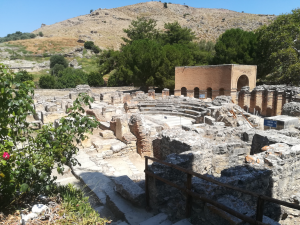
Over de spreker
Dalia Pratali Maffei obtained her BA (2016) and MA (2018) in Classics at Ca’ Foscari University of Venice and later received her PhD title at the University of Cambridge (2023), with a thesis on the dialect of inscribed epigrams, i.e. short poems written on inscriptions. She joined the University of Gent in 2023 as an FWO post-doctoral researcher, with a project on dialect contact between Doric and Koine Greek in the Hellenistic age.
Praktische informatie
Wanneer? woensdag 6 november 2024, om 19u30
Waar? leslokaal 0.4 (Blandijnberg 2, 9000 Gent)
Prijs? gratis voor leden van het Griekenlandcentrum, UGent studenten (m.u.v. PhD-studenten) en scholieren. Anderen betalen €5 aan de kassa.
! Opgelet: deze lezing wordt in het Engels gegeven !